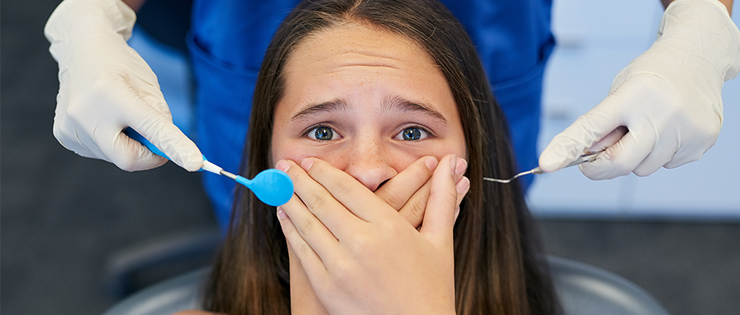
Here's a typical day at work for me: Walk into the practice at about ten to nine, have a look over my cases for the day, then at 9:00am call my first patient through from the waiting room. It's someone I've never seen before, so when they sit down in my clinic I always ask, "What can we do for you today?". The answer, "No offence, but I hate dentists. I haven't seen one for many years because I'm scared", is a common and expected one. As dentists we are used to this being a daily occurrence, and I always appreciate my patient being upfront about their anxiety. It means we can work together to overcome the elephant in the room who is quietly biting its toenails and sweating in the corner.
If you come across a dentist who disregards your anxiety, they probably aren't the right dentist for you. There are plenty of people out there willing to work with anxious patients, because the vast majority of the time the outcome is good.
The appointment I described above typically ends with the patient saying, "Oh that wasn't as bad as I thought it would be. Thank you so much." So how do both the dentist and the patient make it from palpitations at the start to relief at the end? It's genuinely a team effort.
Tell your dentist you are scared
Please be honest. It's not a weakness, or a nuisance, and most of the time no barrier to actually having your treatment completed. If you have specific fears, such as injections, seeing blood, or feeling claustrophobic with things in your mouth, tell your dentist. They will have their own raft of strategies for helping you deal with anxiety before and during treatment, because remember - this is normal for us. Studies have shown that up to 70% of patients experience some anxiety about visiting their dentist, but only about 20% consider it to be severe. Some of the very simple things that can take the edge off are holding a stress ball, having the assistant hold your hand during injections, distractions like TV or music, or having a dentist who happily tells jokes or stories while also fixing your mouth. You may like to bring some of your own items for comfort, such as headphones and your own music, or a friend for moral support. Your dentist should never mind, to us this is a great sign that you're willing to try and overcome your anxiety for the greater good of your healthy mouth.
Before your appointment
Do your best to make sure your brain and body are in the best condition to cope with any anxiety that arises. Allow enough time to travel to the practice, (and find parking), so your journey isn't stressful on its own. If you've never been to the location before, consider a trial-run of the trip so it's familiar. Please don't self-medicate - if you're not completely "with-it" your dentist can't establish that you're giving informed consent for treatment, which is a legal requirement. There's also the potential for your chosen intoxicant to cause serious complications when combined with dental anaesthetics or treatment. Instead, try to have sufficient sleep, eat and be hydrated before your appointment. The physiological reactions to being hungry, dehydrated, and tired can mimic and exacerbate feelings of anxiety. Then you might start worrying that you're feeling more worried than you should be. And worrying about worrying is never helpful.
I've tried all this, I still can't face it
You might be in the small percentage of people who need extra help, above and beyond the simple and safe methods mentioned above. Sedation for treatment is an option at some practices, ranging from nitrous oxide, ("happy gas"), to anti-anxiety tablets you take before your appointment, through to more serious stuff like twilight sedation and general anaesthetics. Most of these require some degree of planning and the dentist having knowledge of what treatment you need completed first, so don't expect to walk into a practice and be sedated on the spot. However, a simple examination and x-rays is usually all that's needed for the dentist to come up with a complete plan for your treatment. That examination appointment is the time to let you dentist know you are scared, and discuss what sedation options are available and appropriate for your individual case. You never know, sometimes I have patients come in requesting sedation before I've even had a look, then we discover they've kept their mouth very healthy and just need a scale and clean!
Prevention is best
It's an old, but true adage. If you have anxiety about dental treatment, the best thing you can do is minimise the amount of treatment you need. Regular examinations and professional cleaning will keep your gums healthy, and find any problems while they are small. What could have been a simple little filling can quickly turn into root canal therapy and a crown, if left undetected and untreated. That's about 30 minutes of chair time, as opposed to 4-5 visits of up to an hour each. Also do what you can at home. It's well established that limiting sugar intake, and brushing every surface of every tooth every day with a fluoridated toothpaste will have the biggest impact on decay and gum disease risk. No disease means minimal treatment required, and minimal anxiety about visiting your dentist.